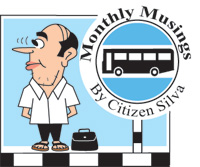Sunday Times 2
Tales from the Arthashastra
View(s): Over the past year I have been musing, quite regretfully in fact, that our country can only be described as a functioning anarchy.
Over the past year I have been musing, quite regretfully in fact, that our country can only be described as a functioning anarchy.
No longer can we pride ourselves that we live in a properly governed democracy.
Fortunately, the inexplicable talent of our people to muddle through – to make good or “Shape Karanna” whatever the situation in which we find ourselves — has kept our country functioning despite the lack of effective leadership from those in office.
Having come through five hundred years of colonial domination and having survived a quarter-century of ghastly civil war we emerged ten years ago into the glare of a globalised world with everything going for us. Looking back on the past decade, I can only ask myself “How could this nation that we love become so unbelievably corrupt so quickly?”
Democracy is described as a form of government wherein the people – the Demos defined by the Greeks – govern themselves. It is envisaged as government of the people, by the people, for the people. Those whom the nation’s citizens elect to public office are responsible for delivering good government for these citizens.
In Sri Lanka, however, the Government is being run by politicians for the benefit of politicians. If truth be told, Democracy has survived in our land because it has proved to be one of the most effective systems for upward social mobility and the acquisition of personal power and wealth. It is a quick way for ‘Have Nots’ to become ‘Haves’. It is in effect a rapid route to personal power, providing an increasing number of ambitious Sri Lankans with the incentive to come forward as candidates for election.
Public servants and members of parliament are required by law to declare their assets. Surely, those eight ministers who (nearly four years after they were elected) have NOT bothered to declare their assets must be having something to hide from the people?
It is a sad reflection on our status-conscious society that a minister’s importance is judged not only by the size of his official residence, the number of subordinates he has under him and the number of security personnel he has to protect him but also by the patronage he can distribute.
To these politicians, what is important is their status in the hierarchy of power – and that their status is recognised by others. Newly elected to office, they soon begin to emulate those they overthrew, seeking a bigger piece of the cake rather than the change of diet we expect. The position these people seek for themselves is to be seen as able to deliver patronage, influence, favours and jobs to their sycophants and supporters. Considerations such as morality and the methods by which such status and power are acquired are not really important.
Sadly, corruption has grown and flourished in our island because to our way of thinking, bribery is not really considered “wrong” as long as it proves efficacious and yields the desired result. Just as there are willing bribe-takers there are also willing bribe-givers!
In Kautilya’s well-known ancient Indian treatise on statecraft, the Arthashastra, the four main Upayas (methods advocated to seize and enhance power) are Sama (conciliation by negotiation and forming alliances), Dama (gifts, inducements and bribery), Bheda (using trickery and sowing disharmony in the opponent’s camp) and Danda (use of superior force). The main thrust of Kautilya’s discourse is that in conducting the affairs of state, Morality is much less important than Expediency.
The politicians who flourish in our land may not have read the Arthashastra (one doubts if some of them even read classical literature) but they can certainly be seen to be following Kautilya’s teachings, functioning as they do in a morally flexible world. Even in their worst actions – actions which would appall us ordinary citizens – they are never held back by their lack of principles nor do they lose faith in their own sense of moral rectitude.
Professions of Morality such as declaring a war on drugs or Ideology such as pledging to uplift the ‘common man’ are invoked for the public arena while a party that is neither United nor acting in the National interest makes a big show about being United and National. Behind the scenes and away from the public gaze in party rooms, where the atmosphere is one of distrust and people are waiting with their daggers drawn but not yet knowing whose back to stab, our erstwhile politicians opportunistically seek new alliances and relationships to manoeuvre themselves close to the emerging powers — utilizing all the Sama, Dama and Bheda they can muster.
As the Arthashastra clearly states and we are witnessing with our own eyes, ‘Miraculous results can be achieved by practising methods of subversion’.

